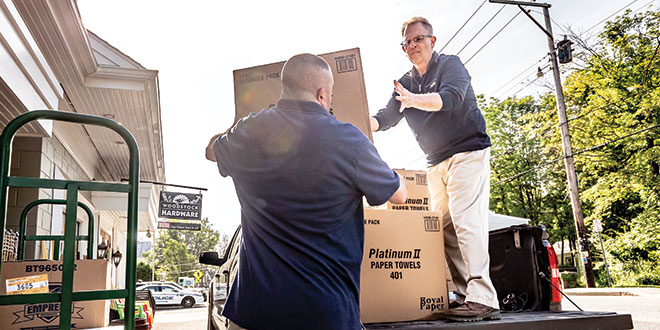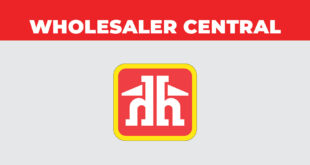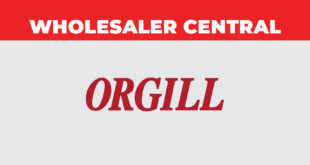Local business owners in small communities often need to go out of their way to stock up on items like toilet paper, cleaning supplies and other business necessities. These types of items are generally in stock at independent home improvement stores or they are easily tacked on to a retailer’s weekly order, with prices and delivery speeds that are competitive with Amazon.
So how can retailers capture those sales?
Woodstock, New York—where Vince Christofora operates Woodstock Hardware—is 20 minutes from the nearest Sam’s Club and big-box stores and 90 minutes from the closest Costco. Those stores, along with office wholesale outlets and online stores, are common places business owners shop for bulk goods. As a small business owner, Christofora recognizes how valuable the time is that he spends in his store. Making supply runs during business hours or on the weekends isn’t always feasible. He also tries to support local businesses in his community as much as possible.
To provide a cost-effective, local solution, Christofora developed a wholesale supply business as an extension of his hardware store.
Read on to learn more about how Christofora runs this complementary operation and hear from one of his customers about the impact.
Something on the Side

Woodstock is only about 100 miles north of New York City, but that distance is enough to make Woodstock feel like a true small town.
When Christofora and his wife Diane bought Woodstock Hardware in 1994, most small businesses in the area purchased their supplies through regional supply houses or warehouses who serviced them using an outside sales force.
“Retail stores like mine met their immediate needs and charged retail prices,” Christofora says.
About 15 years ago, a formidable group of opponents entered the landscape: big-box stores. Christofora says the combination of those stores’ large advertising budgets and proximity to small communities forced many of the previous suppliers to close shop.
“Back then, everyone seemed to have ‘expendable hours’ in their business to send someone shopping to save on consumables they needed for their business,” he says. “These business owners were trained to drive to the big boxes to buy cases of toilet paper and gallons of cleaning spray, somehow thinking they were saving money. In reality, they were neglecting the value of their time and the wear and tear on their vehicles to make the 20-mile round trip.”
When those same customers unexpectedly ran out of everyday business necessities—toilet paper, for example—they would stop by Woodstock Hardware while they were shopping for their personal DIY projects and grab a small package for the office at retail prices.
“I would often hear, ‘Oh, $4.99 for six rolls of toilet paper. I get a case of 45 rolls for only $18,’” Christofora says. “Of course, they were comparing apples and oranges: Quality of name brand versus generic and wholesale versus retail pricing.”
Many retailers prefer to earn the margin on slow-moving convenience items that customers grab when they know they’re running low at home. While those margins still come in through Woodstock’s retail customers, Christofora saw an opportunity to capture sales and support local businesses.
“The natural solution seemed to be to create the wholesale supply program and start showing our customers that they did not need to drive anywhere to buy large quantities or purchase commercial-quality products,” he says. “We started the program as an avenue to create new business and to offer our existing customers a competitive price on larger quantities of products.”
Pricing at Wholesale

The Woodstock Hardware wholesale program wasn’t part of the Christoforas’ original plan for their business. The opportunity didn’t come up until they had owned the store for about 15 years.
“We always only considered ourselves a retail store,” Christofora says. “We just thought our customers came in to buy their retail needs, and they were buying everything else at other places and getting better prices. We have to protect our margin, and we can’t sell our retail products any lower.”
Around the time big-box stores started popping up in his area, Christofora saw a new opportunity. He realized consumers were buying in bulk from those stores at wholesale prices, which meant he could offer similar products at similar prices without hurting his retail margins if he created a wholesale wing of his business.
The wholesale margins at Woodstock Hardware are about half that of the retail margins, and the business rarely sells wholesale products at cost.
Woodstock Hardware has nearly 25,000 SKUs in stock, but not everything is priced for wholesale. Instead, the business finds the right items at the right prices for each customer’s needs through its Customized Supply Plan. The products that are priced through that plan often extend beyond the store’s in-stock inventory.
“When we have an interested customer, we take time to sit down with them and identify any products or supplies they do not currently buy from us,” Christofora says. “We then create a wholesale price for those items to be competitive with what they are paying now. We actually provide a price-match guarantee, and we always try to be a few pennies less.”
One benefit of the customized supply plan is that it offers Woodstock Hardware an in with customers who may not know about the program and may not believe they will get similar or lower pricing.
“I like to focus on using the wholesale program to increase our existing customer sales,” Christofora says. “We all know some version of the 80-20 rule: 80 percent of your sales come from 20 percent of your customers. That’s true for the wholesale program, too, that our current customers were previously retail customers.”
The program also works in reverse: It helps boost retail sales because people who are wholesale customers first often become retail customers.
“Once we get a little bit of their wholesale business, we try to become their retail store of choice,” Christofora says. “The wholesale program starts with earning lower margins to market yourself to then capture regular retail dollars.”
Christofora also offers price-matching for customers who already purchase goods through a big-box store or other source.
“We actually set a lot of prices based on what the customer pays now. We use the price-match guarantee as the tool to open up that conversation,” Christofora says. “We usually start the process with just a few key products, and then once the customer sees how much time and money they save, we add more items.”
Supporting Small Business, the Wholesale Way
 When Christina Brady opened her mixed-media art studio, Fiberflame, in 2011, she purchased supplies from a variety of wholesale supply companies and online retailers. Woodstock Hardware owners Vince and Diane Christofora often brought their children into the studio to make their own craft projects. During one of her visits to Fiberflame, Diane mentioned that Woodstock Hardware was starting its wholesale supply program, and Brady says she was immediately interested.
When Christina Brady opened her mixed-media art studio, Fiberflame, in 2011, she purchased supplies from a variety of wholesale supply companies and online retailers. Woodstock Hardware owners Vince and Diane Christofora often brought their children into the studio to make their own craft projects. During one of her visits to Fiberflame, Diane mentioned that Woodstock Hardware was starting its wholesale supply program, and Brady says she was immediately interested.
“I was so excited to hear about the program. It’s a pretty creative format,” Brady says. “Finding places to purchase the supplies we need, like toilet paper, and items specific to our business, like foam paintbrushes, can be challenging and expensive. It’s a dream come true to be able to call up our local hardware store to get those kinds of supplies.”
Brady places a regular order twice a month for consumable paper products, but she also relies on the team at Woodstock to help her source specialized items.
“If we have a workshop coming up, I know we’re going to need a particular kind of foam paintbrush, so we’ll place an order outside our normal ordering window,” she says.
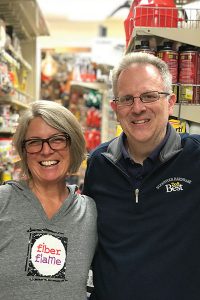 “They are willing to work with me on finding special items that I’ve seen somewhere else, and they bend over backward to find out if they can price-match it for me.”
“They are willing to work with me on finding special items that I’ve seen somewhere else, and they bend over backward to find out if they can price-match it for me.”
Brady appreciates being able to source items for her home and her business in one place.
“There is nothing better than walking into an actual brick-and-mortar store to talk to someone about my specific wholesale needs,” she says.
In addition to saving time and money buying her supplies through Woodstock’s wholesale supply program, Brady says she likes supporting local businesses.
“As local business owners, we try to hold hands as much as we can,” she says. “We know how important it is to support each other. We have to make sure we have each other’s backs to keep our businesses moving and growing. Without that, the community will break down.”
Selling the Program
Christofora doesn’t have the budget for a large outside sales team like many supply companies and big-box stores do. He relies on his staff and his regular marketing to get the word out about the wholesale supply program.
“You have to get your cashiers and other associates to recognize the opportunities with the customers who are already walking in the door,” Christofora says. “If one of my staff members discovers that a customer works at the local manufacturing facility, they should be telling them about the wholesale program. It takes some additional sales knowledge and expertise, but since you’re already working with these other businesses, you have your foot in the door.”
The process of having sales staff talk about the program as part of regular conversation with customers has led to significant opportunities that Christofora didn’t even know were in the area.
“We have a fair number of small business owners who shop in our store for their retail hardware needs, so why wouldn’t we pursue them to provide the supplies they need that they don’t typically think we can provide?” Christofora says. “We were focusing on consumables, but that can mean different things to different people.”
Two of Woodstock’s retail-turned-wholesale customers now purchase items they need for their businesses in significant quantities: 50 gallons of primer and 500 lightbulbs at a time.
“They had businesses 5 miles down the road, and we never knew,” Christofora says.
Without a dedicated team to promote the wholesale program, Christofora uses standard marketing initiatives to spread the word.
“Anything we put out—monthly emails, circulars—includes information about the program,” he says. “We don’t do special mailings to addresses that aren’t already part of our circulation.”
Woodstock’s wholesale customers include industrial or commercial operations, local churches, nursery schools, landscapers, general offices and fire departments. Christofora is open to hiring a part-time outside salesperson who can be dedicated to discovering other potential customers.
“We have a fair amount of opportunities here, but we’re not in a high commercial, small industrial business area,” he says. “We have about a 10-mile radius for opportunities before we start to bump into stiffer competition with electrical, plumbing and restaurant supply houses.”
Through the Supply Chain
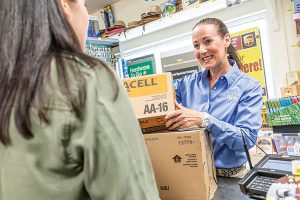
Woodstock Hardware doesn’t have enough storage space on-site to hold backstock for the retail operation and the wholesale business, so most of the products that wholesale customers order arrive at the store each week. Some products, like cases of toilet paper, are kept on hand for the few customers who miss the ordering window.
Otherwise, all Woodstock Hardware wholesale customers submit orders through the company’s online ordering system. Setting up an online ordering system is a must for retailers who are interested in starting their own wholesale program, Christofora says.
“Most customers expect that they’re going to be able to order online late at night, early in the morning, whenever they have time, so you have to have the technology to do that,” he says. “We had an e-commerce site already set up, so we molded that to provide the wholesale services.”
It’s important to offer capabilities that are similar to the competition. In addition to online ordering, customers want to be able to check purchase history, see past invoices and other account details.
“One thing we learned is that it has to be easy for them,” he says. “In some cases, even telling someone to go to our site, search for a product, put it in the cart, let us know and we’ll price it for them is too difficult. To make it a success, there can’t be too many requirements on their end.”
To alleviate some of those initial challenges, Christofora or his store manager often visit first-time wholesale customers to walk through the ordering process. By the end of the meeting, the customer has a cart full of the supplies they need and they have seen how the online ordering system works.
“We have to make sure the wholesale system places the order so we have receipts and purchase orders,” Christofora says. “If that means we need to place an order for the customer in the system, we’ll do that for them.”
On the receiving end, Woodstock does offer local delivery for about 60 percent of orders, while the remaining 40 percent of orders are about evenly split between drop-ships and in-store pickup. In-store pickup often results in additional sales at retail prices, which is another benefit.
“Initially, our customers are happy to save money through the program and use the store pickup service, but they quickly opt to save even more time and money by having us deliver,” Christofora says. “Regardless of how they receive the product, the program shows them how great it is to not have to drive 15 miles to get a case of toilet paper.”
 Hardware Retailing The Industry's Source for Insights and Information
Hardware Retailing The Industry's Source for Insights and Information



